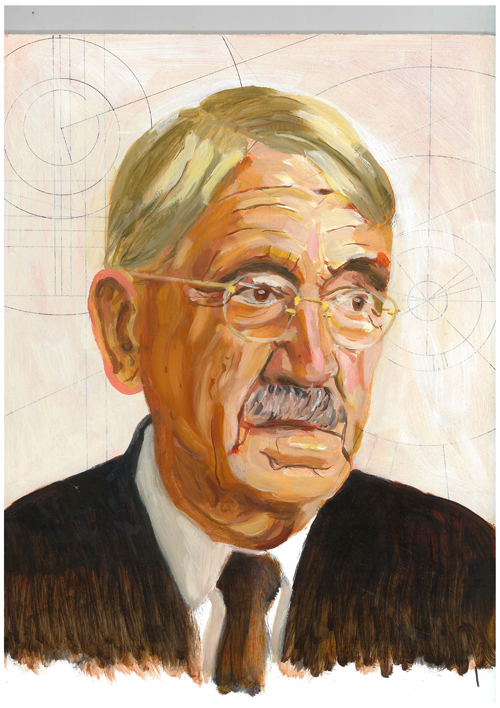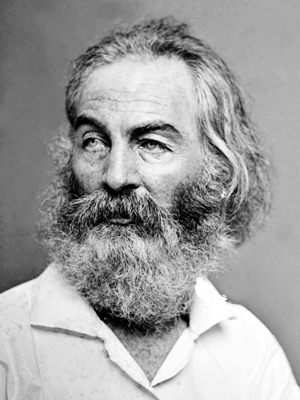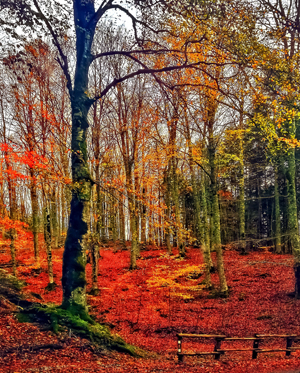
Your complimentary articles
You’ve read one of your four complimentary articles for this month.
You can read four articles free per month. To have complete access to the thousands of philosophy articles on this site, please
Articles
Poetry & Philosophy for the 21st Century
Benjamin Lloyd gets Dewey-eyed over resonant rhymes.
John Dewey, the father of American Pragmatism, spearhead in the field of education and psychology, acclaimed author and prominent twentieth century scholar, also had a deep appreciation for the arts. More specifically, he had a love for poetry. He even wrote some poems of his own, which were eventually discovered among his papers and published in a volume many years after his death.
Dewey (1859-1952) found himself alive during a time of incredible turmoil, industrialization, economic growth, and scientific advancement. With so many aspects of modern life changing from day to day, perhaps it’s not surprising if he sought solace in poetry. It seems that for Dewey writing verse may have been more than a cathartic creative outlet or an artsy hobby. In fact, Dewey thought that poetry could be the replacement that fills the spiritual void left in the West by the decline in religious faith and in the traditions of the past. This is the notion he put forward in a commencement address to the graduating class of Smith College in the spring of 1890. As the young scholars eagerly awaited the completion of the final formality of their college educations, Dewey opened his speech with a passage from The Study of Poetry by English literary critic and poet Matthew Arnold:
“The future of poetry is immense, because in poetry, where it is worthy of its high destinies, our race, as time goes on, will find an ever surer and surer stay. There is not a creed which is not shaken, not an accredited dogma which is not shown to be questionable, not a received tradition which does not threaten to dissolve. Our religion has materialised itself in the fact, in the supposed fact; it has attached its emotion to the fact, and now the fact is failing it. But for poetry the idea is everything; the rest is a world of illusion, of divine illusion. Poetry attaches its emotion to the idea; the idea is the fact […] More and more mankind will discover that we have to turn to poetry to interpret life for us, to console us, to sustain us. Without poetry our science will appear incomplete; and most of what now passes for religion and philosophy will be replaced by poetry.”
For Dewey this is more than a mere question of whether the future of humankind looks to philosophy, science, theology, or poetry for the answers to life. In fact, Dewey is concerned that poetry will lose its genuineness, its sustaining force, if it is cut off from accountability. ‘Who keeps the keeper?’ asks Dewey, and his answer is Truth (see Poetry and Philosophy, the text of Dewey’s Smith College speech, pp.110-112).

John Dewey by Darren McAndrew
Observing a Changing World
The superpower of the poet is the ability to observe the same world other individuals observe and to interpret it in a way that will resonate: “Poets cannot be freed from the conditions which attach to the intelligence of man everywhere” (Ibid, p.113).
The ever-growing expanse of human knowledge concerns Dewey in the realm of poetry, in the sense that the rapid advancement of the application of science is requiring poetry to adapt to it. The American theoretical physicist Richard Feynman (1918-1988) once said, “it is a poor poet who falls silent upon learning the Sun is a massive sphere of hydrogen fusing into helium.” I believe this quote directly relates to Dewey’s concerns. Indeed, poets cannot be freed from the conditions of human understanding. Rather, these conditions free the poet to behold the world with the genuineness for which Dewey calls. Yet as Feynman intimated, no scientific or philosophical revelation could diminish the truth expressed in, for example, Walt Whitman’s Give Me the Splendid, Silent Sun (1865):
Keep your splendid, silent sun;
Keep your woods, O Nature, and the quiet places by the Woods;
Keep your fields of clover and timothy, and your corn-fields and orchards;
Keep the blossoming buckwheat fields, where the Ninth-month bees hum;
Give me faces and streets! Give me these phantoms incessant and endless along the trottoirs!
Give me interminable eyes! Give me women! Give me comrades and lovers by the thousand!
Whitman notes the beauty of nature and the ‘quiet places by the Woods’; but there is an unrest within him, and in the final line of the poem we bear witness to the evolution of culture. The poem’s rejection of the quiet places by the woods, the fields of clover and wheat, highlights humanity’s shift from finding consolation in natural beauty to finding it in the presence of others.
This transformation is clearly observed after the events that took place in or around the early twentieth century – global war, famine, and ecological destruction unprecedented in the history of our world, much less of our species. When humanity is being hit by the existential threats that plagued that century (three influenza pandemics, two world wars, multiple famines, deadly oppression) it’s hard to be consoled by a simple walk through the woods. In our own day of advanced information technology, we also will likely turn to ‘comrades and lovers’ for emotional solace in our dark hours, rather than to nature.
But if poetry is to be our stay, as Dewey suggests, upon what authority does Whitman isolate man from nature? What truth does he find in women, faces, and streets? And can we still look to these verses a hundred and fifty years later to console ourselves?
Of course, Whitman’s words ring as true today as the day they were written. After extended periods of quarantine and social isolation, we cannot so easily look to the natural world for support. Now, more than ever, we need human connection and social experiences. The genuine truth that Whitman exposes is verified by the human condition we’re experiencing today, and it doesn’t seem to be losing any momentum. Even in this era of instant, easy international communications, we still find ourselves craving face-to-face contact.
Gold & Frost

Walt Whitman
So truth and nothing but truth is to be discovered in the profound lines of Walt Whitman. Shall we find the same upon exploring the verses of Robert Frost?
Frost’s Nothing Gold Can Stay (1923) briefly reflects on the impermanence of life; and again we get an especially effective comparison with nature and its beauty:
Nature’s first green is gold,
Her hardest hue to hold.
Her early leaf’s a flower;
But only so an hour.
Then leaf subsides to leaf.
So Eden sank to grief,
So dawn goes down to day.
Nothing gold can stay.
This concise verse on the uncertainty of life reminds me immediately of the passage from Matthew Arnold: no creed not shaken, no tradition undissolving. Just as Dewey suggested of Arnold’s poetry, Frost’s poem also reminds us of the great philosophy of Stoicism and the writings of Marcus Aurelius. But just as Dewey did not mean to suggest Arnold had translated Aurelius’s Meditations into poetic verse, neither do I claim that Frost has transcribed Stoic philosophy into eight lines: rather that similarities arise from a similar truth observed by these writers.
Inspiration from the Stoics is evident in more of Frost’s verse, such as Precaution (1936), a collection of short poems on the span of life:
Will the blight kill the chestnut?
The farmers rather guess not.
It keeps smouldering at the roots
And sending up new shoots,
Till another parasite
Shall come to kill the blight.
Notice Frost’s continued use of metaphor and imagery revolving around nature. Yet while nature is a heavy theme that Frost relies upon for his content, he, like Whitman, doesn’t seem to find much solace in it.
Again we must ask ourselves what truth is to be found in these lines. The claims that Frost makes in these verses are what we generally observe of life. Everything in order eventually turns to disorder – this is the law of entropy. The chestnut, which is temporarily spared from the blight, will eventually wither and rot. Is Frost obsessed with death? Or can we find consolation in our mortality?
As was the case with Whitman, we don’t have to do mental gymnastics to sympathize with the truths that Robert Frost claims in his poetry. These truths embody the experience of human life, undeterred by advancements in scientific knowledge or by religious revelation. I find it easy to believe that Feynman had the verse of Robert Frost on his mind when he spoke of the skills of the poet.
Poetry For The Modern Mind
So now we find ourselves at the ‘unnatural wound’ that Dewey speaks of – the unbridged gap between science and poetry, which is also the disconnect between man and nature. In the world that Arnold envisioned, man has broken free from the celestial chains of religion in search of a new source of consolation and comfort that he is unable to find in the realms of science and philosophy. Is this not reminiscent of the world we live in today?
Experiments, tests, hypotheses, records, and revisions – these are the tools of the scientist. Whereas scientists concern themselves with knowledge, the philosopher focuses on wisdom. Logic, questioning, and discussion are the tools of the trade of philosophy. But the tool of the poet is observed emotion and lived experience as he focuses on truth.
For sure, the poet is not free from the verifications of science, nor the inquiry of the philosopher. Indeed, if the poet’s verse does not remain consistent with these forces, there will be no truth to be found in them. But in neither Whitman’s nor Frost’s verses do we find scientific inaccuracies or philosophical fallacies. Nevertheless, we do indeed find the stay and consolation that Arnold predicted we would find in poetry, and that Dewey said we so desperately need.
If in poetry we search for an anchor – a consolation for the cold facts that science gives us and the hard wisdom that philosophy interprets for us - surely it is there to be found in these verses of Whitman and Frost. If science gives us fact, and philosophy strives for wisdom, then poetry gives us existential truth. Again, the ideas communicated in poems find their authority in the verifiable truth of the experiences shared commonly by people. And although the truths handed to us by Frost, Whitman, and other poets are not freshly discovered, they are delivered in such a way that relates to our experience. Should these ideas be reinterpreted by possibly even more skilled poets, the truths conveyed by these lines would nevertheless not be diminished.
Poetry For The Universal Mind

The purpose of poetry
Autumn in the woods © Propoli87 2021 Creative Commons
As I mentioned, for poetry to be accepted as truth, especially under the guidelines given by Dewey, the words must reflect the common experience of humanity. This common experience will be a set of cultural and environmental stimuli not only shared by a single society or community, but globally, and which also persist throughout time. Here ‘the common experience’ differs from cultural traditions and communal rituals, in that the latter die out and are only shared by the individuals of a certain group. And we note that in the age of social media, variations between distinct groups are as clear as the similarities between them.
Despite the differences (or perhaps even because of them) the poet must elevate her point of view so that she can relate her experiences to individuals across cultures and times, lest her verse be only a partial rendering of the world. In other words, good poetry rings true to all perceptive individuals regardless of their background or cultural upbringing.
This is precisely why we still study, read, and enjoy Shakespeare, Donne, Dante… The daily life of Dante Alighieri would be so different from that of you and I, and the knowledge available to him so limited in comparison, that it is hard to imagine he could write anything still worth studying eight centuries later. But studying it is exactly what we find ourselves doing. And the truths that Frost and Whitman write are the same truths that were available to and were accessed by William Shakespeare and John Donne. And finding a man struck by lightning after winning the lottery might be easier than finding one who has not heard a line from Hamlet (whether they’re aware of it or not).
Stay With Poetry
In closing, one may look back at Dewey’s speech and find that he is predicting that as scientific knowledge advances exponentially, the split between man and nature will continue to widen. He seems to suggest that although this rip will outgrow religions and traditions, we ought to turn to poetry to reconcile the divide.
On one hand, I suggest we keep in mind David Hume’s notion that one cannot get an ought from an is: that one cannot look at the way the world is and determine from that observation the way it ought to be. The great poets that Dewey references may have observed this very division; but as we see from Whitman and Frost, this partition has encouraged man to form stronger bonds with his comrades and lovers, and to appreciate nature when he can.
On the other hand, however, I agree that mankind indeed ought to look to poets to interpret the knowledge and wisdom brought to us from science and philosophy. The difference between those truths and the truths interpreted via poetry are but differences of language. Poetry is more accessible, more easily understood and related to by most people. Since this is the case, the poet is the architect tasked with bridging the gap between science/philosophy and humanity. Science is but a mere tool to understand how the world works; philosophy but a means of discourse to understand how we gain that knowledge; but poetry is a way to interpret our understandings to humankind. Indeed, in poetry we shall find an ever surer and surer stay.
© Benjamin Lloyd 2022
Benjamin Lloyd is a philosophy student at Northern Kentucky University with a passion for literature.









